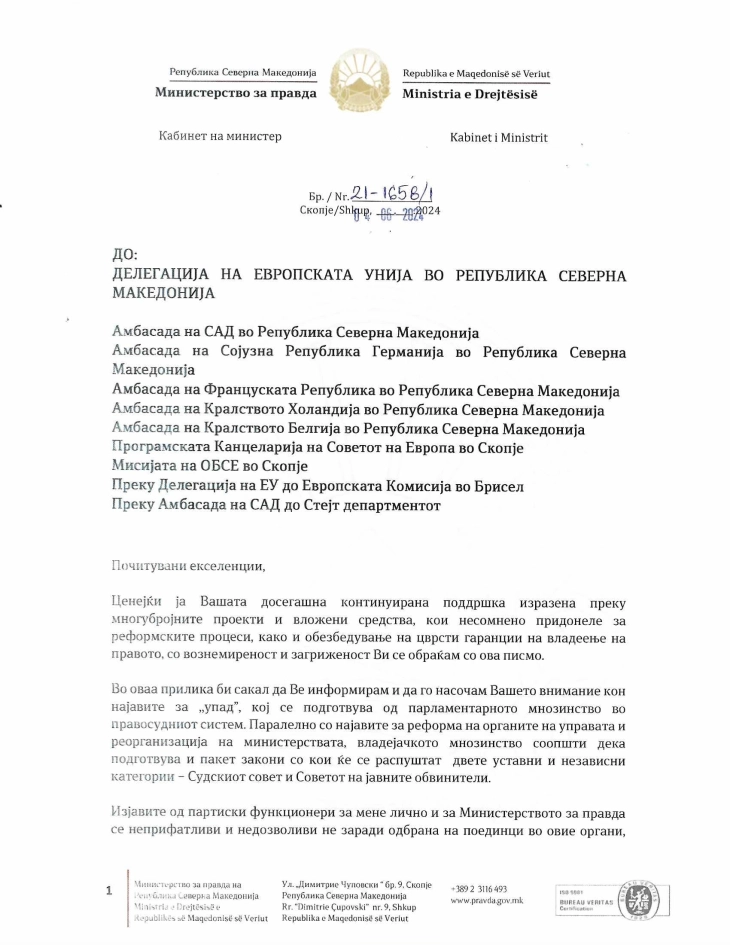Lloga voices concern over possible dissolution of Judicial Council and Council of Public Prosecutors
- Justice Minister Krenar Lloga sent letters to the EU Delegation in North Macedonia, the embassies of the United States, Germany, France, the Netherlands and Belgium, the OSCE Mission to Skopje, the Skopje Office of the Council of Europe, the Department of State via the US Embassy in North Macedonia and the European Commission in Brussels to voice his concern following the announcement of the parliamentary majority that it is drafting a set of legislation aimed at dissolving the Judicial Council and the Council of Public Prosecutors, the Justice Ministry said Tuesday.

Skopje, 4 June 2024 (MIA) – Justice Minister Krenar Lloga sent letters to the EU Delegation in North Macedonia, the embassies of the United States, Germany, France, the Netherlands and Belgium, the OSCE Mission to Skopje, the Skopje Office of the Council of Europe, the Department of State via the US Embassy in North Macedonia and the European Commission in Brussels to voice his concern following the announcement of the parliamentary majority that it is drafting a set of legislation aimed at dissolving the Judicial Council and the Council of Public Prosecutors, the Justice Ministry said Tuesday.
In the letters, he says he wants to divert their attention on the possible “intrusion”, prepared by the parliamentary majority in the judicial system.
“In parallel with the announcement to reform the state bodies and to reorganize the ministries, the ruling majority has announced it is preparing a set of legislation aimed to dissolve the Judicial Council and the Council of Public Prosecutors, the two constitutional and independent categories,” Lloga says.
The Minister calls the statements of the party officials “unacceptable and impermissible”, adding the goal is not to defend individuals in these bodies, but to preserve the independence and unbiased character of these institutions after the Peer Review Mission released a report noting what steps should be taken by the state bodies to improve the judiciary.
Lloga recalls that last year following the events in the Judicial Council, he had suggested termination of the council members’ terms, which wasn’t met with support by the coalition partners and the opposition parties. “Also, after having consultation meeting with your representatives, I was told that the Peer Review Mission will scan the situation in the Judicial Council and will issue recommendations to overcome the situation, for which we were given a report.”
The report’s recommendations, Lloga says in the letters, were carefully reviewed by top judicial officials, academics and experts as well as the civil society and other involved parties. These recommendations have been included in key documents, including the strategy for development of the judicial sector, the rule of law roadmap and the growth plan. Also, a working group for legislation reforms of the Judicial Council was set up. “Representatives of VMRO-DPMNE, the then main opposition party and the largest party in the now ruling majority, were invited on several occasions, but there was no response,” the Minister recalls.
We, Lloga stresses, voice serious concern that such concentration of power of the three branches in one political party would allow the pre-2017 state of affairs and problems to be copied, which had created a capture state, noted in multiple reports of international organizations.
“This announcement is rushed and dangerous and we believe that the ruling majority should respect the process of appropriate policy creation, which involves an assessment of the state of affairs and consultation over all coming duties and responsibilities of the Republic of North Macedonia in agreement with the European Union and other international partners,” Lloga concludes in the letters.
During the election campaign, VMRO-DPMNE had been vowing if it won the elections, amongst other things, to dissolve the Judicial Council and the Council of Public Prosecutors in a bid to implement in-depth reforms in the judicial system and the state administration.







